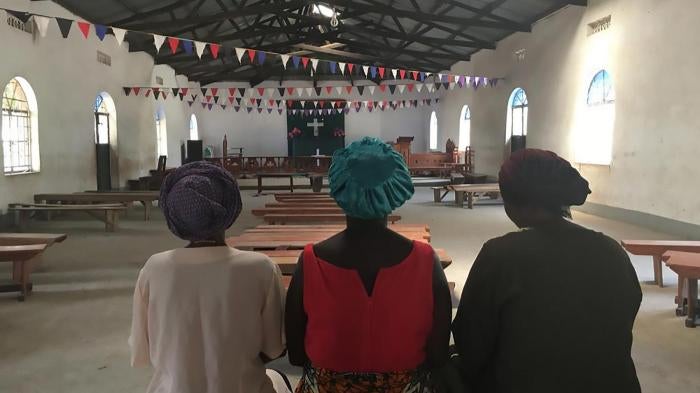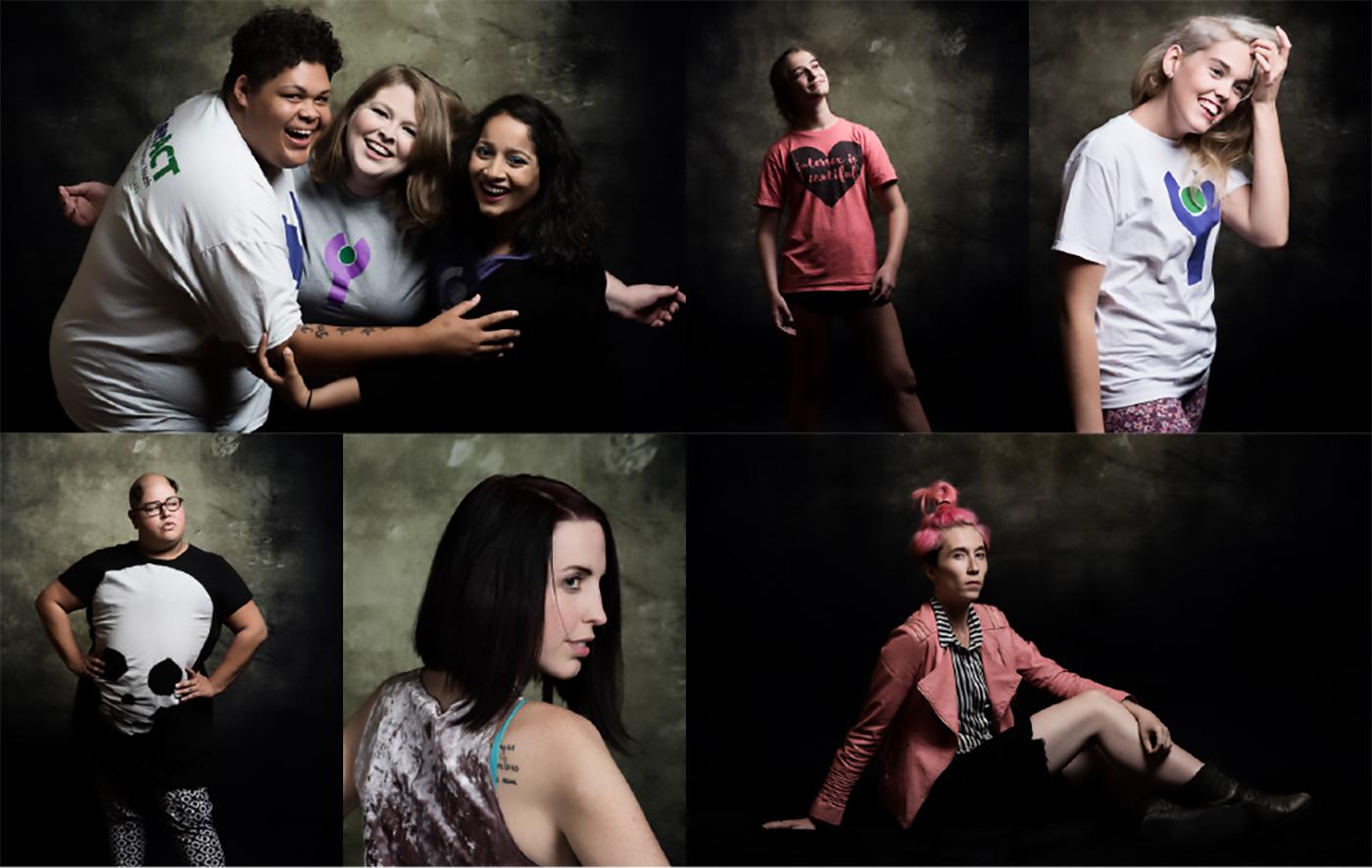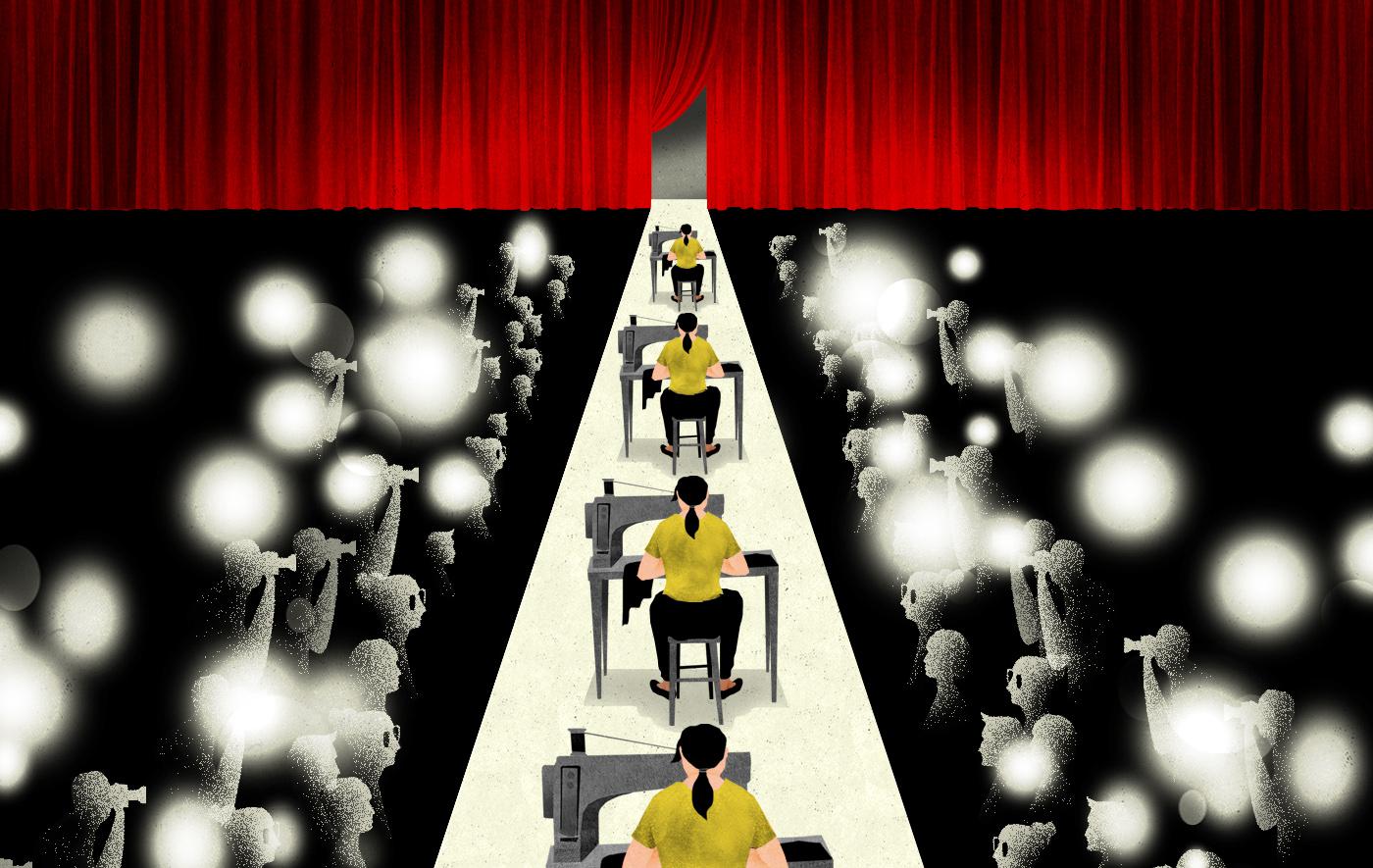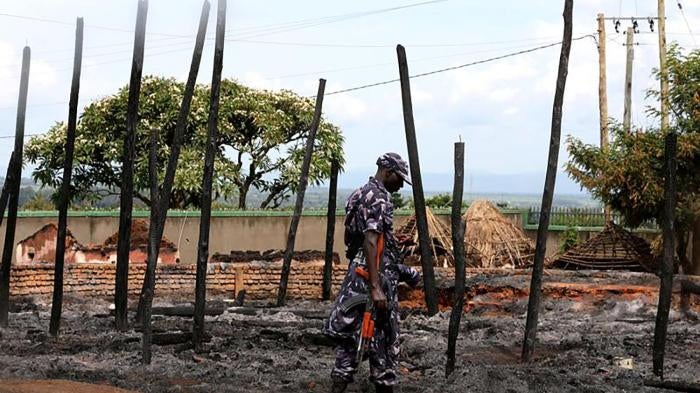The government of President Yoweri Museveni, in power since 1986, continues to violate free association, expression, and assembly rights.
Protests over constitutional amendments that would entrench the power of the ruling elites—one to remove the presidential age limit, allowing Museveni to run for office in 2021, and another to dramatically ease government’s ability to acquire land without meaningful advance consultation and adequate compensation—met with heavy-handed partisan response from police.
Security officials’ continue to use excessive use of force with impunity, for example there was no investigation into the November 2016 military and police assault in Kasese that left over 100 people, including children, dead.
Freedom of Assembly
The police unjustifiably block, restrict, and disperse peaceful assemblies and demonstrations by opposition groups, relying on the vague and overbroad 2013 Public Order Management Act (POMA) which grants police wide discretionary powers over public and private gatherings.
In July, police arrested and detained 56 members of the opposition Forum for Democratic Change (FDC) for three days on charges of holding an “unlawful assembly” at a private home on the outskirts of Kampala. Police also arrested and detained members of the opposition Democratic Party in July and August as they prepared to address the public to oppose the draft constitutional amendment lifting the age limit of presidential candidates. In contrast, in August and September police in Arua, West Nile and Kabale escorted demonstrators advocating in favor of the constitutional amendment.
In September and October, police arrested several prominent opposition leaders and protestors in several towns during protests againt the lifting of presidential age limits. Police killed at least two people in Rukungiri and one in Amolatar while using excessive force to disperse what they deemed “illegal rallies.” And yet, in October, police charged opposition leader Kizza Besigye and two colleagues with murder, assault, inciting violence, and unlawful assembly for the deaths of protestors in Rukungiri.
Freedom of Expression and Media
The government consistently uses a variety of laws to curtail media freedom and free expression. Government regulatory bodies, particularly the Uganda Communications Commission, applies laws and broadcasting guidelines selectively to arbitrarily shut down radio stations and curtail speech critical of the president or the government.
After parliamentarians clashed during age limit debates in September, the commission issued a directive banning any live broadcasts of the controversial issue. Police arrested four journalists in Lira for providing coverage of public protests and two Kampala-based editors were charged with offensive communication in October for their newspapers’ ongoing reporting.
Dr. Stella Nyanzi, a research fellow at Makerere University, faced charges of “cyber harassment” and “offensive communication” in April for Facebook posts challenging the president and his wife, the education minister, for failure to fulfil a campaign pledge to provide sanitary pads to school girls. Nyanzi spent more than a month in prison before being released on bail; charges remain pending.
Television journalist Getrude Tumusiime Owitware received threats online and was later abducted and beaten by unknown assailants, after posting on social media in support of Nyanzi’s campaign. Owitware was later found at a police station in Kampala. No one had been arrested at time of writing for her abduction and beating.
Journalists, at times, were interrogated and faced charges of criminal defamation, which remains law, despite a 2014 ruling from the African Court on Human and People’s Rights that such laws are an unnecessary restriction on free expression.
Extrajudicial Killings and Absence of Accountability
The government refused to investigate the conduct of its forces during military and police operations at the palace compound of the region’s cultural institution and other locations in Kasese, western Uganda from November 26 to 27, 2016. Over 100 civilians were killed including at least 15 children, in operations the government argued were required to curtail activities of the institution’s royal guards.
In March, the police increased previous figures they claimed were inaccurate, stating the death toll was 103. Without credible independent investigations, the true death toll remains unknown. Witnesses report government-orchestrated efforts to silence them from speaking about the events on November 27.
At least 180 people, including six children, face murder, treason, and terrorism charges, among other crimes, for the November violence, including deaths of 14 police. Charges remain pending.
Government spokespeople argued Uganda “does not lack independent investigative capability”, but deflected calls for such investigations into the role of government forces in the killings of civilians in Kasese, arguing that there could not be interference as the matter was before a court and therefore sub-judice, or pending litigation. However, none of the ongoing prosecutions involve soldiers or police.
Illegal Detention and Torture
Police and prosecutors consistently failed to investigate cases of illegal detention and torture of suspects and did not charge a single security personnel under Uganda’s Prevention and Prohibition of Torture Act.
Human Rights Watch and other organizations have documented numerous instances of mistreatment and torture, particularly in Nalufenya police post in Jinja, eastern Uganda over several years. Suspects are often held at the post for periods well beyond the 48 hours, permitted by law. Defendents arrested after the Kasese violence and detained in Nalufenya showed clear signs of mistreatment and torture during court hearings. The magistrate ordered an investigation, which remained pending at time of writing.
In May, defendants charged in the March murders of police commander Andrew Kaweesi, his driver and bodyguard also had visible injuries and complained in open court of severe beatings by police in Nalufenya. In July, the high court ordered medical examinations of 19 suspects. Photos later emerged of the mayor of Kamwenge, in western Uganda, bearing horrific injuries which he said resulted from beatings by police investigating the same murders.
Freedom of Association
In September, police raided three nongovernmental organizations (NGOs) offices, alleging “illicit financial transactions” and “subversive activities” and froze bank accounts. The organizations publicly opposed amending constitutional limits on presidential age. The raids were widely seen as part of a crackdown on civic activism opposed to the change.
The 2016 Non-Governmental Organisations Act includes troubling and vague “special obligations” of NGOs, such as a requirement that groups should “not engage in any act which is prejudicial to the interests of Uganda or the dignity of the people of Uganda.” Another provision criminalizes activities by organizations that have not been issued with a permit by the government regulator, fundamentally undermining free association rights. A separate provision allows imprisonment for up to three years for violating the act.
Police failed to make progress on accountability for over two dozen break-ins at NGO offices, all known for work on sensitive subjects—including human rights and corruption. In two instances, guards were killed, but no one was arrested.
Sexual Orientation and Gender Identity
Same-sex conduct remained criminalized under Uganda’s colonial-era law, which prohibits “carnal knowledge” among people of the same sex. Concerns remain that the 2016 NGO law effectively criminalizes legitimate advocacy on rights of lesbian, gay, bisexual, and transgender (LGBT) people.
In August, activists canceled Pride celebrations in Kampala and Jinja after the minister of ethnics and integrity threatened organizers with arrest and violence.
Police failed to end the practice of forced anal examinations of men and transgender women accused of consensual same-sex conduct. These examinations lack evidentiary value and are a form of cruel, inhuman, and degrading treatment that may constitute torture.
Lord’s Resistance Army
The Lord’s Resistance Army (LRA) remains active in central Africa, but allegations of killings and abductions have reduced. In May, the Ugandan military withdrew its forces mandated to fight the LRA in Central African Republic. (See Chapter on Central African Republic.)
The trial of former LRA commander, Dominic Ongwen—charged with 70 counts of war crimes and crimes against humanity as part of attacks on internally displaced persons (IDP) camps, including murder, enslavement, sexual and gender-based crimes, and conscription of child soldiers—continued before the International Criminal Court (ICC). Warrants for four other LRA commanders have been outstanding since 2005; three are believed dead. Joseph Kony is the only LRA ICC suspect at large.
In February, prosecutors in the case against former LRA fighter Thomas Kwoyelo, charged before Uganda’s International Crimes Division (ICD), brought 93 counts including wilful killing, taking hostages, and extensive destruction of property under article 3 of the Geneva conventions and Uganda’s penal code. Kwoyelo has been imprisoned since March 2009 and the start of his trial has been postponed numerous times.
Key International Actors
The United States and European Union publicly raised serious concerns over the disproportionate use of force by security forces in Kasese and repeatedly called for independent investigations. European Union member states also offered to support witness protection and evidence protection for investigations into the Kasese violence but the government declined. The US also criticized the government’s curtailing of dissent on the constitutional amendment as “heavy-handed.”
The US ended providing military advisors and support to Uganda’s army for the counter-LRA operations but continues to provide significant funding for logistics and training to the African Union Mission in Somalia, where Uganda contributes troops.
The US provides over US$440 million annually to support Uganda’s health sector. US President Trump reinstated the Mexico City policy, which stops organizations from supporting safe abortion care, negatively affecting Ugandan organizations working to clarify the legal status of abortion services.
In August 2016, the World Bank suspended new lending to Uganda due in part to weaknesses in social safeguards monitoring after allegations emerged that workers on a bank-funded road project sexually abused children. In May, the bank resumed funding, arguing improved compliance.






